- Home
- Shirley McKay
Lammas Page 5
Lammas Read online
Page 5
The tumbler on the pier had stripped down to his hose. Each piece of clothing he took off was greeted by a rolling of the drum, and a rumble in the crowd, grumbling at the boy to hurry himself up. The boy took his time. He opened up his sack. Inside were two metal balls that looked like cannon shot. The juglar told Marie that the balls were weights. The boy would hold one in each hand, as he walked the rope, and they would keep him straight, like the balance of a scale.
‘What if he should drop one?’ Marie said.
‘Then he will fall in, and the crowd will roar. They will stamp and jeer, and like it all the more.’
Marie thought it likely that was true. Most people watching would prefer it if he fell. The juglar sounded sad, and Marie wondered if he was feeling sorry for the boy. But when she asked him, he telt her he was not. He believed that the show would outshine his own, which he was hoping to perform in the inn that night.
‘The one with the egg and the bat?’ Marie asked.
He telt her that he thought the bat had died. That was no matter, for he had another trick. But he could not do it without help.
Marie said, ‘What help?’
‘The help of a lass who has the kind of face to keep a man transfixed. A sonsie face like yours.’
Marie was flattered then. ‘What is the trick?’ she asked.
‘A disappearing one.’
Her eyes opened wide. ‘What will you disappear?’
‘Anything you like. Any kind of thing can be made to disappear. The trick is distraction,’ he replied. Elspet stepped back. She could no longer bear to look at the boy’s face, caught in concentration, in a clasp so powerful that it frightened her. The boy’s face turned to stone, still and sculpted, strange. He listened to the wind. He did not hear the crowd.
Elspet had drifted to the far side of the pier, where the water rose and broke upon the rocks, showering her with spray. She looked on a sun that was sultry and dark, heavy with heat, in an indigo sky. The rush of the water had drowned out the crowd; the rush of the crowd had drowned out the drum; the beat of the drum had drowned out the sea, lulled to a hush as the rattle came quick, tight on its surface like sweet Lammas rain. Elspet looking back to hear the drumroll’s rush saw the boy step out, taut above a pool so dark and smooth and still it seemed to hold its breath. Elspet turned again, and Sliddershanks was there. His face was grained and grey, desolate with grief. The rushing of the water took away his words, and cast them to the wind.
(7)
Andrew Wood, the crownar and sheriff for Fife, held no jurisdiction at the fair. He had come to town to collect the rents for his brother’s mill, and was at the tolbooth on that day by chance. So when a witness came to report a crime he referred the matter to the powder court. The bailies, when they heard the case, referred it back to him. According to the witness’s account, a woman had been thrown from the pier, in full view of her friends, a slaughter with intent, which was his concern, and no concern of theirs.
A death at a fair was a rare and grave thing, and unlawful killing counted with the worst. Fairs took place on ancient soil, on what had once been sacred days, and blood spilled there could tarnish and corrupt the spirit of the fair itself. Such superstitions, never now expressed, none the less were felt, and the bailies did their best to distance these events. The woman had been taken by the sea, therefore her destruction had not happened in the town.
Sir Andrew gave the order for the building of a gallows in the market place, before the sun went down. The penalty for slaughter was plain and unequivocal. But when he came to the harbour to make his arrest, he found that the report did not reflect the facts. The case was far from clear.
In the first place, there was no sign of a corpse. The person in question had gone missing from the fair. Sir Andrew made a last attempt to refer the matter back to the powder court, but with no success: the witnesses were certain that the lass was dead. The witnesses, he found, were nothing of the sort. The girl had fallen from the pier, they said, but none of them could swear they saw her fall. Her body had been taken by the tide, but none of them had seen it swept away; the tide had turned before they thought to search. They showed a plaid, found on the rocks. No one could confirm it was the missing girl’s.
‘There is nothing, then, to prove that she was pushed, or even that she fell,’ he pointed out.
As witness to the fact, they brought to him a slattern, racked with sighs and sobs, and a student so drunk that he could hardly stand. The student had danced with the missing lass. He was on the pier, and she ran after him. There he had passed out. He had not seen her since.
The girl had more to say, though none of it coherent, in between her wails. Elspe was her friend. She was very dear to her. They had worked together at the harbour inn. Their master was a man called Walter Bone. Elspe had a sweetheart, and Walter had found out. He had flown into a rage, and said that he would kill her.
‘What were his words?’ Andrew Wood said, for the words made a difference to the fact.
‘He would swing for the limmar, he said.’
‘By which he meant that he would kill Elspe?’
‘I didna understand him at the time,’ Marie said, ‘but he went to do it all the same. He went to push her aff the pier.’
‘And did you see him do it?’ Andrew asked her patiently. He was a patient man. His patience in the past had been a shrewd relentlessness, tenacious in pursuit until he got his man. Now it was resigned; he was weary of a post he was close to giving up, called forever back to attend to one last crime. This might be the last man he would have to hang. He would not be sorry if it was.
‘Ah didna see him,’ Marie said. ‘But she wis on the pier, and he went rinning efter, and ainly he com back.’ She blurted out the rest.
The tumblers had been walking on a rope across the water, and everyone had watched. When the walk was done, they came back to the inn, where there was going to be a magic show.
The magician who intended to put on the show stood by Marie’s side. He offered her the comfort of a string of coloured handkerchiefs, on which to blow her nose. The crownar took an urgent and immediate dislike to him. He belonged to a class of man Sir Andrew had no wish to see about the town, or any town in Fife. On any other day, when there was no fair, he would have him whipped. He was no more than a beggar and a thief. What was a juglar, but a common trickster? What was a trickster, but he ought to hang? No word of his, or this foolish girl’s, had any scrap of worth.
Marie said that she had looked for Elspet at the inn. She had not found her there. But she had found Walter Bone, in the lassies’ sleeping chamber, sitting on the bed that she and Elspet shared. When she tried to speak with him, he was wild and strange. Then she had seen the ribands in his hand, that Elspet had been wearing at her breast. That was when she screamed.
To illustrate the point, she began to scream again. ‘Mak the wench whisht, or I will,’ Andrew warned, and the juglar took the lassie in his filthy clasp. Sir Andrew turned, disgusted, to examine Walter Bone.
Walter had the ribbons still, the single piece of evidence with any substance to it. He said that the girl had given them to him.
‘And why would she do that?’
‘I dinna ken,’ Walter said.
‘Where is she now?’
‘I have nae idea.’
The crownar scratched his head. He was still undecided what he should do next when he saw Robert Lachlan coming through the mill port, with Hew Cullan by his side. Robert Lachlan he disliked intensely. His feelings for Hew were a good deal more ambivalent. Hew was an expert in resolving mysteries, and rooting out the source of anomalies like these. Yet while he was adept in solving certain problems, he caused as many problems as he solved. His involvement was not likely to simplify the case. Therefore Andrew’s welcome to him was at best lukewarm.
‘This man is my client,’ Hew told him.
‘Your client,’ the crownar said. ‘Why does that not surprise me? You may speak to him here, in my hearing. I
will not wait while you play with words, nor would I have you put an answer in his mind that was not founded there.’
This was not what Hew had hoped for. But Robert had primed him with the essential facts, and he asked Walter straight, ‘Have you hurt the lass? Did you kill her, or anyone else?’
‘I did not,’ Walter said.
‘Then,’ Hew said to the crownar, ‘I urge you to take him into ward, and keep him under guard until the girl is found.’
Sir Andrew Wood had not expected such a straight response. ‘You believe him guilty, then?’
‘On the contrary,’ said Hew. ‘I am convinced he is telling the truth. He has committed no crime.’
‘He has committed no crime. Yet you would have me lock him up. This man is your lawyer, sir. How do you like that?’ Sir Andrew put to Walter, who replied simply, ‘I did no wrong.’
Hew urged the crownar, ‘You ken me. Then trust me. I cannot tell you more, for it is a matter of the closest confidence. Evil will be done if you do not lock him up.’
‘Will I hang him too, an it please your grace?’
‘That is the conclusion I am trying to avoid.’
‘Aye, very well. Let the bailies take him.’ Sir Andrew had grown tired of the game. He returned to Henry Balfour. ‘This student too, who was on the pier. The hussy says she saw him with the lass. Therefore I must count him also for a suspect, if a crime is done. Which is far from clear.’
‘By no means,’ said Hew, intervening quickly. ‘This is Lord Balfour’s son.’ He knew Henry from his efforts in the public examinations, where he had presented several days before. ‘He cannot be allowed to influence your witness. Much more will be gained be keeping them apart. And since he is too drunk to speak with reason now, I will take him home.’
A voice was heard to murmur somewhere in the crowd. ‘Rich laws for the rich, and that’s a fact.’
Henry had revived his wits sufficiently to say, ‘I am lodging in the South Street, with Professor Black.’
‘Are you now?’ said Hew. ‘Then God help you both.’
Robert Lachlan helped him to take Henry home. ‘Ye maunna fault a man that cannot haud his drink, when he is but young. He has yet to learn. Yon scholars at the college havna taucht him richt.’ He slapped Henry hard between the shoulder blades, a gesture of collegiate conviviality, which Henry threw straight back, in a spurt of spew. Robert sidestepped swiftly ‘Manners of a whore, for aw that.’
Robert Black turned ashen when they brought him to the door. ‘How can he be so drunk? Tis not gone eight o’clock! What devil have you done to him?’ he asked.
‘Nought but saved his skin,’ said Hew. ‘You will not believe the trouble he is in. He has no idea of it himself. If you value his life, lock him in his room, and do not let him out before I come again.’
‘What do you say? His life is in danger?’ The regent wrung his hands. ‘What will I tell his father? What am I do? He is in my charge for the next two months.’
Robert Lachlan grinned at him. ‘Aye? Good luck wi that.’
Walter Bone was locked in the tolbooth for the night. He had no more to say. He kept Elspet’s ribbons tightly in his grasp. The crownar made no attempt to wrest them from him. He took no interest in the case. In the morning, early, he went back to the harbour, and established that the incoming tide had recovered no trace of the girl. He spoke to several of the fishermen, who had taken their boats out at night, and concluded that there was no charge to answer. He returned to the tolbooth, and set Walter free. He was not going to hang a man for a scrap of thread.
August 2
(1)
Elspet had woken up naked and cold. She looked about for clothes, and finding Michael’s shirt the closest thing to hand, she put it on. It held her in his scent, bloody and deep like the scent of a calf. Michael lay still fast asleep. He was naked too, his hair like crumpled corn rigs, tousled tufts of gold, his bare limbs flung carelessly over the fleece. Their bed was a sheepskin, spread out on the floor. Elspet felt his body on her skin, in every part of her.
He woke and rose at once, instantly alert. ‘Why would you no wake me?’
‘I was sleeping too,’ Elspet said. ‘It is early still.’
Michael said, ‘Tis late. Gie me back ma sark.’
He is fearful for his work, Elspet thought. Michael had been hired by Robert Lachlan at the Lammas fair. It was good work, he telt her. Honest and well paid. At Michaelmas, when it was done, there would be a feast. They might kill a pig, and the drink would flow. Elspet could come too. She would be his guest.
He stood above her, supple and awake; every part of him had woken strong and proud, and Elspet felt inside her a hollow kind of longing, aching to be filled. How could she be empty, still? He opened up a gulf in her. She drew up her knees, and tucked the shirt under her. ‘Take it, then,’ she said.
Michael laughed fondly. ‘I could. God kens, I would. But I hae to work.’
He thought if he was late he would lose his place. But it was early yet. Elspet did not like Robert Lachlan. He had gone away with Maude, and come back on his own. Elspet had supposed that meant that Maude was dead. But Robert had not said. He drank, sometimes, at the harbour inn, as though what happened there was of no consequence. She did not like that Michael worked for him.
‘Not till eleven, you said.’
Michael looked out at the sky. ‘It must be after ten. Sliddershanks will miss you at the inn. You will have to think a lie to tell him. That you couldna sleep, and went out for a walk, before the sun was up.’
She had been supposed to slip out after dark, when the inn was closed, with everyone asleep.
But Elspet had not kept to the letter of their tryst. She had slipped away while the show was on.
She had come to the place that Michael called his own, a ruined shepherd’s hut. For door it had a scrap of cloth. Its roof was open to the skies, where Michael pitched a canvas up, to shelter from the rain. The rain that promised did not fall, and they had lain all night together underneath the stars, his jewels for her, he said. Michael had been drinking in the town, and he had not appeared until it was quite dark, and Elspet was afraid. Then his touch had found her, waking every place she had not known she harboured there, asleep.
‘He kens,’ Elspet said.
Michael was already pulling up his breeks, tying round the leather cord that served him for a belt, taming, tying down, the rising of his love. He stopped to stare at her. ‘What?’
‘He saw us at the fair. He telt me at the pier. When you won the race and gied the ribbons to me. Sliddershanks was there.’
Elspet had not cared. When he had accused her, she had plucked the ribbons from her breast and taunted, ‘Take them, then. Have them for yersel’! What kind o creature are ye, peeping, spying on us?’ Now she felt a pang, to think how hurt he looked.
Michael cursed, a long stream of profanities, spilling out like seed. Elspet shrank from it. ‘Why does it matter now? Now that we are handfast, and will soon be wed.’
‘Elspet.’ Michael sighed. He squatted down beside her, and cupped his hand around her face, turning it to his, so she could see his seriousness. She shivered at his touch.
‘It is Lammastide. And you ken full well that that is coupling time. You are the bonniest thing. The loveliest lass that I ever went with. Ripe and yielding. Sweet.’
‘You said that last night.’
‘I meant it. But, Elspet, tis harvest time. The harvest will be done. And when the corn is gone, then I will be too.’
‘Where will you go?’ Elspet said.
‘Far away. Over the hills. Ach, dinna be sad. It will not be a while yet. And you can come again. Now you must go awa and mak your peace wi Sliddershanks. He will take you back. He likes you.’
‘But am I not your wife?’
‘Whisht, no more of wives. It was Lammas play, and no more meant than that. Wipe your face. I cannot abide to see a lass greet.’
She did not think that she was greeting. It could
not be tears, but dew on her cheeks. She could not be crying, for she felt nothing inside her but coldness and dark, as though a door opened had let in a draught, and filled up the chasm with nothing but ash.
‘You can come again, if you will not cry, on another night. I will stay till Michaelmas. You liked it, did you no? You will not tell me no. For I ken you did.’
He kissed her on the lips before he let her go, standing up again. ‘I have to go and piss. While I am gone, you should get dressed.’
Michael went outside, to the back of the hut, and presently she heard a sound that streaming on and on chilled and emptied her. She hugged her knees close, wondered how they felt so solid, when she was a husk, with nothing inside.
A shadow crossed the door, and someone spoke her name, in a voice so filled with sorrow and with tenderness she knew it was not his. Elspet looked up, and was not surprised to see that it was Sliddershanks. She thought she could not bear the sadness in his eyes. She wanted to tell him not to look at her. For I am nothing now. She spoke to him instead as she might have done on any other day. ‘How are your sair banes?’
He thanked her. ‘No sae bad, the day.’
‘I am glad of that. For you have come some way to see us,’ Elspet said. ‘How did you find the place?’
Careful and polite, as if she might get up, and offer him a cup of something cool to drink, a bannock on a plate, to thank him for his pains. But there was nothing here that lent to hospitality.
‘Jonet telt me. Jonet has a wean, with hair like crumpled corn, the image of its da, and she got him here. You did not think,’ said Sliddershanks, ‘that you were the first?’
She knew that she was not. ‘Why did you let me?’ she said.
‘They thought I had hurt you. They kept me away.’
‘Who could think that? You never would. You should have telt them.’
‘And shamed you?’ he said. ‘I would never dae that.’

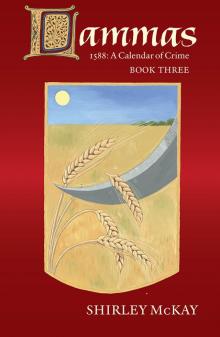 Lammas
Lammas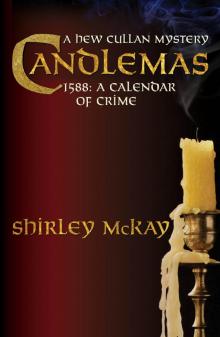 Candlemas
Candlemas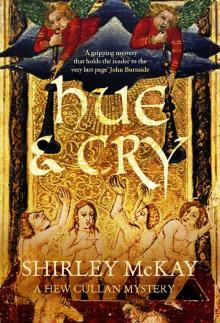 Hue and Cry
Hue and Cry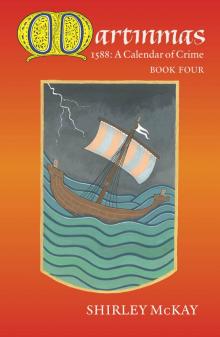 Martinmas
Martinmas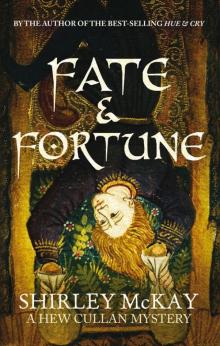 Fate and Fortune
Fate and Fortune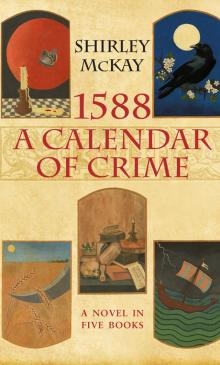 1588 A Calendar of Crime
1588 A Calendar of Crime Time and Tide
Time and Tide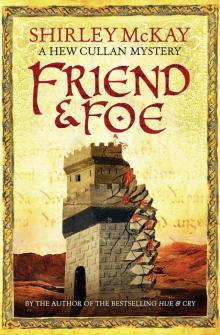 Friend & Foe
Friend & Foe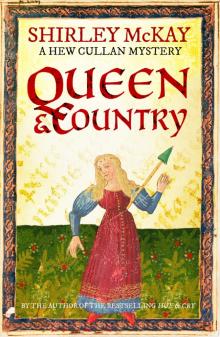 Queen & Country
Queen & Country